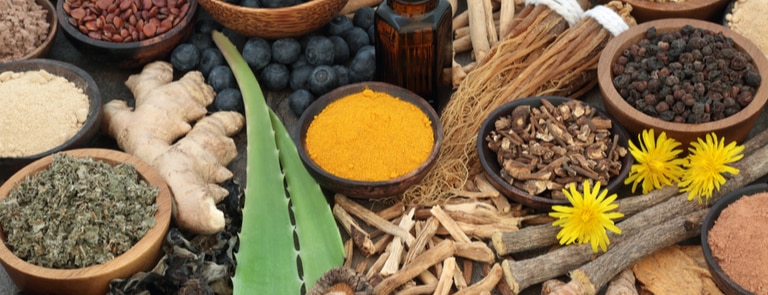10% off £35
Everything you need to know about adaptogens

Life can get a bit hectic sometimes, and we’re all looking for ways to switch off when things get a bit much, right?
Whether it’s a relaxing bath, a bit of yoga or switching off from the world of social media – the need for a bit of calm in your life is as great as ever these days, so anything is worth a try.
In this article we’ll be looking at adaptogens, a group made up of holistic herbs, fruits and mushrooms that are understood to bring stability and harmony to even the most stressful of lives.
The theory behind adaptogens is that they can help your body adjust to physical, chemical or biological stress. But how do they work?
We’ll look at adaptogens, their health benefits and what foods and supplements you can use to make sure you’re getting enough to bring some relaxation to your life.
What are adaptogens?
As the name might suggest, adaptogens help the body adapt, adjust and reset itself from emotional and physical stress.
The term ‘adaptogen’ was introduced to science in 1957 by Russian toxicologist, Nikolay Lazarev who refers to adaptogens as ‘substances that increase the state of non-specific resistance in stress’.1
The thought is that adaptogens can provide calm at times of stress, bring peace when your mind is racing at night or energy when tired.
Generally speaking, Lazarev says that adaptogens have the four N’s.
- Nourishing – bring nutritive strength
- Normalising – helping to regulate energy that may be low and lower areas such as stress that may be high
- Non-specific – act on multiple parts of the body at the same time
- Non-toxic – be completely safe when used over extended periods of time2
What do they do to the body?
Adaptogens may help to support with stress by helping to regulate the release of stress hormones which are produced by the adrenal glands. They support the body’s immune function using biological response modifiers (BRMs).
When your immunity is compromised in any way, your body adapts to different stressors and adaptogens are thought to protect against these stresses. This is thought to work by replacing your deeper immunity and helping to stabilise your body’s response to stress.
H&B nutritionist, Alex Glover says:
“Adaptogens are plant and botanical extracts that can have a measurable effect on our bodies stress response through interacting with something called the hypothalamic pituitary adrenal axis.
They can affect the secretion of hormones like cortisol, adrenaline and aldosterone.”
This means that adaptogens work by keeping a table balance of chemicals that are related to your stress responses. Typically, when we get stressed, our bodies go through three stages of stress, which include:
- alarm phase
- phase of resistance
- phase of exhaustion
When your body encounters stress – for example, lifting weights – your body’s response is to send out hormones like adrenaline to help improve your muscle performance and ability to pay attention to tasks in the phase of resistance.
This allows for your body to literally resist the stress being caused by lifting weights. Because you're resisting this stressor, your body is boosted and more energised by this, then as you fatigue, you enter the stage of exhaustion. Adaptogens basically allow you to enjoy the phase of resistance for longer.
10 benefits of adaptogens
More research into the full benefits of adaptogens is ongoing. However, the studies that are available suggest that adaptogens may be helpful in decreasing symptoms of fatigue and exhaustion. This is thought to be most useful for people who are having treatment for chronic and acute medical conditions.3
Resident nutritionist, Alex Glover, explains that adaptogens studies illustrate that they may help in times of mental and physical exhaustion, or when your body recovers from extensive exercise.
There have also been studies that show that they may help with low mood and mild anxiety, but more research into this is needed.4
While more study is needed to fully back up their benefits, manufacturers of adaptogens also claim that adaptogenic herbs may also have benefits such as:
- improve overall wellbeing
- increase energy
- support organ function
- reduce stress response
- increase inner strength
- maintain normal blood sugar levels
- optimise protein synthesis
- positively affect cortisol levels
- maintain normal cholesterol ratios
- regulate the hormonal balance
6 adaptogens recommended by health experts
There are many adaptogens on the market, however there are six that are considered to be the most important when it comes to your health5, these include:
Ashwagandha* is thought to be a well-known adaptogen as it possesses qualities that support the immune system and anti-inflammatory benefits. However, more specifically it's thought to help you produce more white blood cells, fight fatigue and improve autoimmune health when you have symptoms of stress.
-
Rhodiola
Rhodiola is considered of the original adaptogens, which is useful for relief and focus. Studies also illustrate that it may be beneficial for fatigue and improving concentration.6
Eleutherococcus, or Siberian ginseng as its also known has been used in Chinese medicine for centuries with the consideration that it is good for the soul. These days it's thought that eleutherococcus is good way of resorting your energy. Research shows that it may also support adrenal gland function and help support the breakdown of stress hormones in your body.
-
Cordyceps
The medicinal mushroom, cordyceps as an adaptogen is believed to be good for your liver, kidneys and heart. Although more thorough research is needed.
However, the most established research associates cordyceps which looks at erectile dysfunction in men. There's also evidence that it can work as an aphrodisiac for ladies too.7 More recent research has also found that there may be evidence to suggest that it can improve energy, with participants in a study finding that they were able to exercise for longer.8
-
Schisandra
Schisandra is a lesser-known Chinese red berry. Chinese traditions suggest that it helps support the immune system and possesses stress fighting qualities.9
Funky looking Passion flowers grow in Southeast America and are usually pink or purple in colour with unique stamens and styles (the sticky-up bits that pollen sits on). Its leaves, stems and flowers have been used for medicinal purposes for many years.
One study on passion flower trialled giving people with anxiety passion flower extract for four weeks. The results showed that passion flower could be an effective drug for the management of generalised anxiety disorder. However, a larger-scale studies are needed.10
How to add adaptogens to your diet
The easiest way to add adaptogens to your diet is through a supplement, which are widely available. You can find them in certain mushrooms, such as reishi and lions mane. However most adaptogens are quite unique and not found in many foods.
Some adaptogens such as ginseng and other herbs can found in teas, so if that’s your preference then it may be worth looking around.
Are adaptogens suitable for everyone?
If you have underlying health conditions you may want to speak to your GP or a health professional before adding adaptogen supplements to your diet. Because they may have physiological effects, there's a chance that they can interact with your current prescriptions.11
The final say
Adaptogens aren’t necessarily a new introduction. They’ve been used traditionally as way to improve stress, increase energy, and improve concentration. However, historical research has been mixed and some claims may not be as accurate as first expected.
The advice in this article is for information only and should not replace medical care. Please check with your GP or healthcare professional before trying any supplements, treatments or remedies. Food supplements must not be used as a substitute for a varied and balanced diet and a healthy lifestyle.
*This product is not suitable if you are pregnant, breastfeeding, taking any medications, or have endocrine disorders, liver or heart problems, or clinical depression. This product is not intended for use by persons under the age of 18.
Last updated: 26 November 2021
- https://www.ncbi.nlm.nih.gov/pmc/articles/PMC6240259/
- https://www.ncbi.nlm.nih.gov/pmc/articles/PMC6240259/
- https://www.ncbi.nlm.nih.gov/pmc/articles/PMC3991026/
- https://www.optimallivingdynamics.com/blog/the-best-brain-boosting-herb-for-depression-and-fatigue#
- https://www.eatingwell.com/article/292256/what-are-adaptogens-and-are-they-good-for-you/
- https://www.ncbi.nlm.nih.gov/pmc/articles/PMC3541197/
- https://www.ncbi.nlm.nih.gov/pmc/articles/PMC3909570/
- https://www.ncbi.nlm.nih.gov/pmc/articles/PMC3909570/
- https://www.ncbi.nlm.nih.gov/pmc/articles/PMC6412213/
- https://pubmed.ncbi.nlm.nih.gov/11679026/
- https://www.eatingwell.com/article/292256/what-are-adaptogens-and-are-they-good-for-you/














